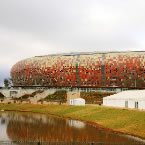South Africans continue to hold positive expectations and attitudes towards the 2010 Soccer FIFA World Cup.
A comparison of the 2006 polling data from the Human Science Research Council's (HSRC) on-going 2010 longitudinal survey shows relatively little change in broad public expectations from those held in 2005.
The dominant segment of respondents continues to believe that the event will bring lasting and widespread economic benefits to the country, and in their area of residence.
They also believe that the country and their local authority will be ready to host the event.
However, detailed analysis shows that, in some cases, public attitudes are becoming more nuanced, and respondents more critical about specific issues around 2010.
The HSRC's 2010 project leader Dr Udesh Pillay said the polling data found that respondents continued to believe that the main advantage to South Africa's hosting of the World Cup would be in the form of economic and employment benefits.
"In the first survey, 62 percent of respondents believed that the 2010 FIFA World Cup will ensure economic growth and job creation, and the percentage dropped to 51 percent in the second survey," said Dr Pillay.
This, he said, was a substantial decrease, although partly countered by respondents who - over the two waves of the survey felt that the World Cup would "increased business opportunities".
Dr Pillay said the results suggested that with the more visible and public-focused planning for the event and debate that was more widespread, respondents were being more specific in their expectations, and not seeing benefits in broad and amorphous terms.
"In other words, South Africans were beginning to be more realistic and discerning about their expectations," said Dr Pillay.
He said while 57 percent of respondents believed that their local authority would be able to meet the demands of hosting the event, this also reflected a drop from the 62 percent of respondents in the first survey.
Respondents in the Eastern Cape showed the biggest increase in critical assessment of local authority readiness, doubling from 22 percent in 2005 to 44 percent last year.
"Respondents may well feel that failure on the part of their municipalities to deliver basic services over the past year mitigated against them meeting more stringent and demanding 2010 FIFA World Cup obligations in the run-up to the world biggest soccer spectacle.
In addition, the public assessment of the main disadvantage to hosting the event showed some possibly significant changes over the two year period.
In the first survey, the largest segment of respondents believed that consumer price increases would be the main drawback of hosting the event, followed by those who believed that it would lead to an increase in crime.
The latest survey shows that these categories are now reversed.
Twenty-nine percent of respondents now believe that an increase in crime will be the main disadvantage, and this is followed by 22 percent of respondents who fear an increase in prices.
Dr Pillay said the pervasive crime situation in the country possibly explained this shift, with respondents probably feeling that hosting the World Cup could well provide criminal elements with an environment further conducive to perpetuating their trade.
"Fear of crime was spread reasonably uniformly around the country, although slightly higher among urban formal housing dwellers and among respondents in farming areas," he said.
Thirty-four percent of wealthier respondents, measured on the living standards measurement (LSM) barometer, cited fear of crime as a major drawback associated with the hosting of the event, compared to 25 percent and 27percent of persons on the "low" and "medium" categories on the LSM scale.
The latest survey also recorded a large increase in public knowledge of South Africa's hosting of the world's premier sports event.
Dr Pillay noted that persons living in rural areas continued to display low public knowledge of the event.
While only eight up to 10 percent of persons living in urban areas said they did not know that South Africa would host the event, between 15 percent and 19 percent of respondents living in either the former homelands or on farms remained ignorant of this.
Furthermore, Dr Pillay said government communication and widespread media interest explained the overall shift.
He said that while results of public knowledge among rural inhabitants were not unexpected, it indicated that 2010 communication strategies needed to target persons living in rural areas.
He further said it was encouraging that Government's National Communication Partnership (NCP) was attempting to address such situations.
"The next installment of this longitudinal series will be conducted towards the latter half of 2007, with the results to follow around this time next year.






 For
all your Football tickets and events from around the globe be sure to check
out Finaltickets.com. Specialising in tickets that are normally considered
hard to find. We have the lot so dont forget that's www.finaltickets.com.
Click here to visit
For
all your Football tickets and events from around the globe be sure to check
out Finaltickets.com. Specialising in tickets that are normally considered
hard to find. We have the lot so dont forget that's www.finaltickets.com.
Click here to visit 


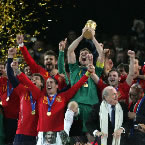

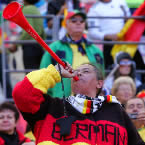
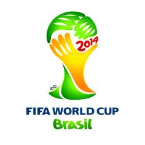
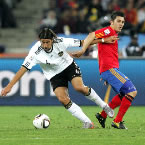
.jpg)



